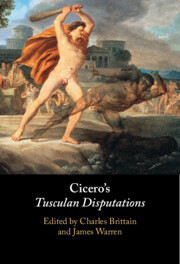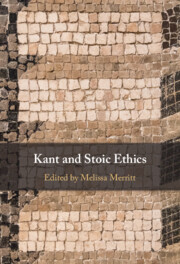Refine search
Actions for selected content:
278 results
Chapter 2 - How Thought Experiments Work
- from Part I - The Origins of “Thought Experiment” in Kant and Ørsted
-
- Book:
- Kierkegaard and the Structure of Imagination
- Published online:
- 26 September 2025
- Print publication:
- 16 October 2025, pp 35-46
-
- Chapter
- Export citation
Chapter 7 - Cicero, Octavian and the Failure of Republican Leadership
-
-
- Book:
- Leadership in the Ancient World
- Published online:
- 14 September 2025
- Print publication:
- 16 October 2025, pp 153-175
-
- Chapter
- Export citation
Chapter 4 - Cicero’s De morte
-
-
- Book:
- Cicero's <i>Tusculan Disputations</i>
- Published online:
- 11 September 2025
- Print publication:
- 18 September 2025, pp 56-78
-
- Chapter
- Export citation
Chapter 3 - Persuasion and Plausibility in Tusculans 1
-
-
- Book:
- Cicero's <i>Tusculan Disputations</i>
- Published online:
- 11 September 2025
- Print publication:
- 18 September 2025, pp 35-55
-
- Chapter
- Export citation
Chapter 7 - The Role of Magnitude in Stoic Emotions
-
-
- Book:
- Cicero's <i>Tusculan Disputations</i>
- Published online:
- 11 September 2025
- Print publication:
- 18 September 2025, pp 121-141
-
- Chapter
- Export citation
Chapter 1 - Introducing the Tusculans
-
-
- Book:
- Cicero's <i>Tusculan Disputations</i>
- Published online:
- 11 September 2025
- Print publication:
- 18 September 2025, pp 1-11
-
- Chapter
- Export citation
Chapter 2 - The Aims and Argument of the Tusculan Disputations
-
-
- Book:
- Cicero's <i>Tusculan Disputations</i>
- Published online:
- 11 September 2025
- Print publication:
- 18 September 2025, pp 12-34
-
- Chapter
- Export citation
Chapter 8 - Peripatetic metriopatheia in the Tusculan Disputations
-
-
- Book:
- Cicero's <i>Tusculan Disputations</i>
- Published online:
- 11 September 2025
- Print publication:
- 18 September 2025, pp 142-162
-
- Chapter
- Export citation

Cicero's Tusculan Disputations
-
- Published online:
- 11 September 2025
- Print publication:
- 18 September 2025
Chapter 1 - Introduction
-
- Book:
- Performing Justice in the Later Roman Empire
- Published online:
- 07 August 2025
- Print publication:
- 21 August 2025, pp 1-25
-
- Chapter
- Export citation
From Individual Virtue to the Just State: Cicero and the Legal Nature of Roman Political Thought
-
- Journal:
- The Journal of Roman Studies , First View
- Published online by Cambridge University Press:
- 15 August 2025, pp. 1-19
-
- Article
-
- You have access
- Open access
- HTML
- Export citation
Introduction
-
-
- Book:
- Kant and Stoic Ethics
- Published online:
- 18 July 2025
- Print publication:
- 07 August 2025, pp 1-10
-
- Chapter
- Export citation
Chapter 1 - Ethical Formulae in Ancient Stoicism
- from Part I - Law and ‘Duty’
-
-
- Book:
- Kant and Stoic Ethics
- Published online:
- 18 July 2025
- Print publication:
- 07 August 2025, pp 13-30
-
- Chapter
- Export citation
Introduction: Did Romans Have Law?
-
- Book:
- The God and the Bureaucrat
- Published online:
- 17 July 2025
- Print publication:
- 31 July 2025, pp 1-30
-
- Chapter
-
- You have access
- HTML
- Export citation

Kant and Stoic Ethics
-
- Published online:
- 18 July 2025
- Print publication:
- 07 August 2025
Chapter Two - Mollitia: Reading the body
-
- Book:
- The Politics of Immorality in Ancient Rome
- Published online:
- 28 February 2025
- Print publication:
- 06 March 2025, pp 63-97
-
- Chapter
- Export citation
Chapter 10 - Hume on Eloquence and the Failings of English Political Oratory
- from Part III - Politics
-
-
- Book:
- Hume's <i>Essays</i>
- Published online:
- 02 January 2025
- Print publication:
- 09 January 2025, pp 187-204
-
- Chapter
- Export citation
Chapter 1 - A Short History of Glory
- from Part I - Glory
-
- Book:
- Glory, Humiliation, and the Drive to War
- Published online:
- 19 December 2024
- Print publication:
- 02 January 2025, pp 9-30
-
- Chapter
- Export citation
Chapter 6 - Translocal Lyric
-
- Book:
- The Environmental Poetry of Augustan Rome
- Published online:
- 12 December 2024
- Print publication:
- 19 December 2024, pp 228-257
-
- Chapter
- Export citation
Chapter 1 - Local Dwelling and Pastoral Place in Vergil’s Eclogues
-
- Book:
- The Environmental Poetry of Augustan Rome
- Published online:
- 12 December 2024
- Print publication:
- 19 December 2024, pp 20-59
-
- Chapter
-
- You have access
- HTML
- Export citation
